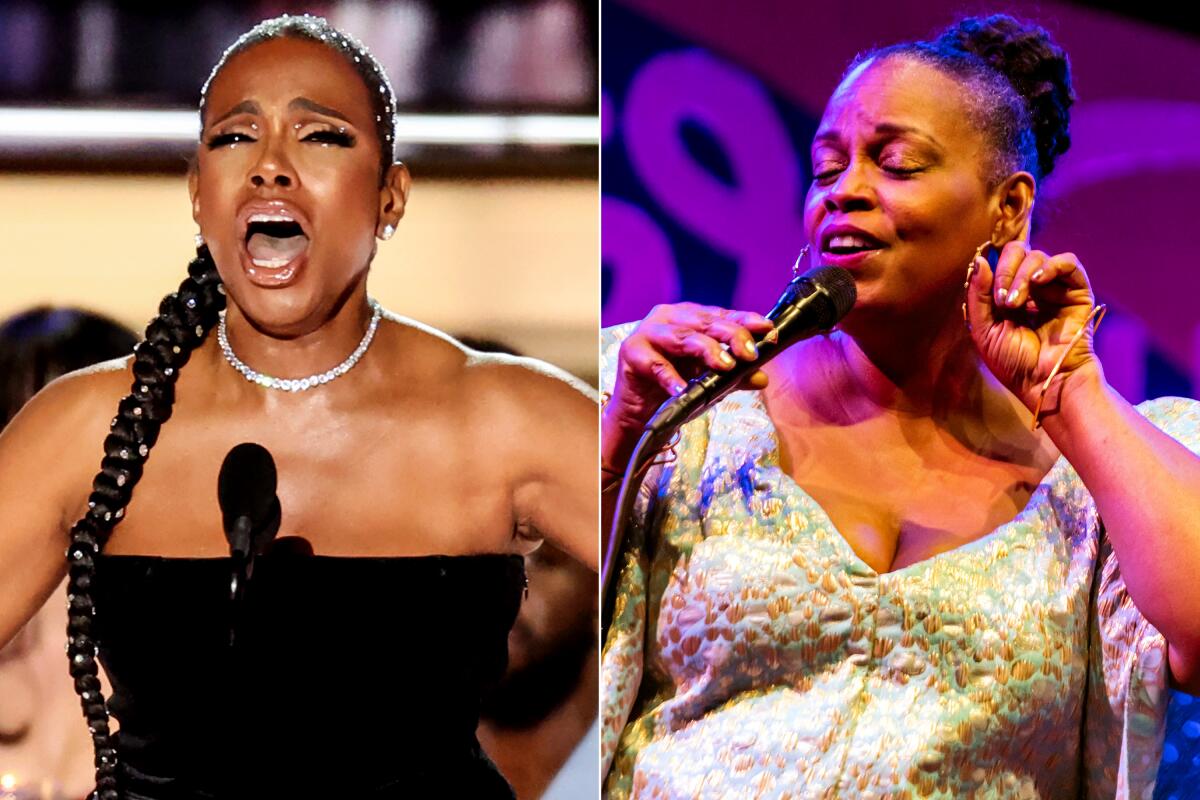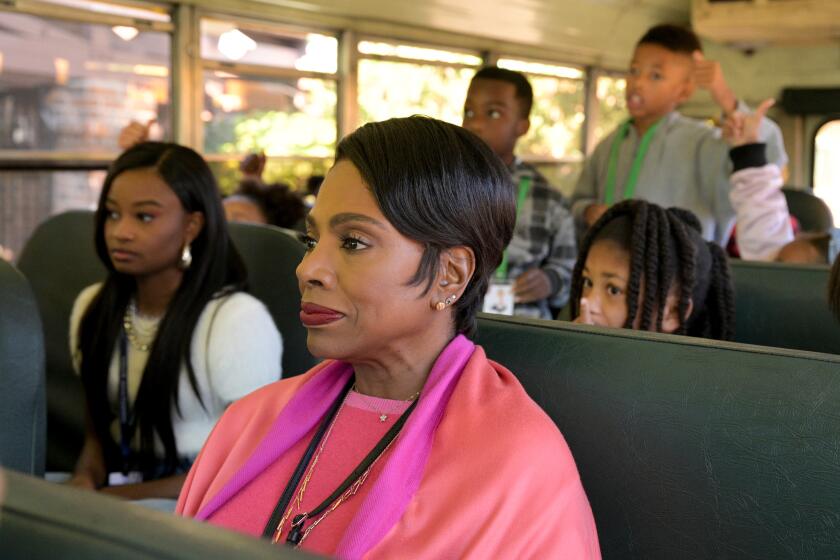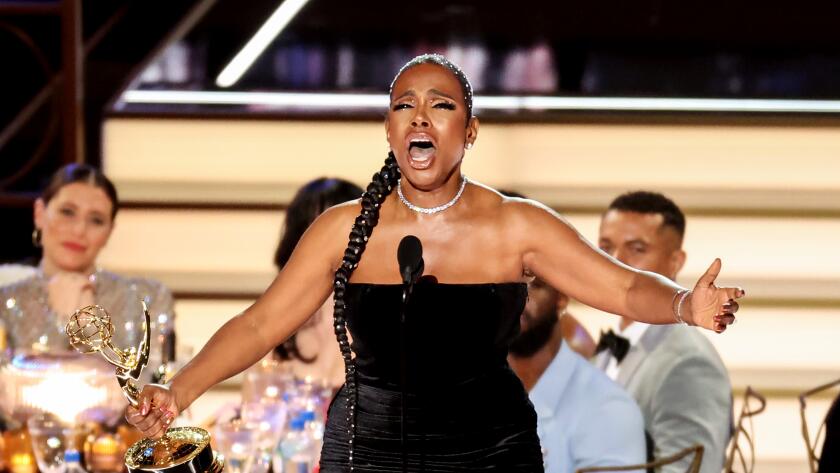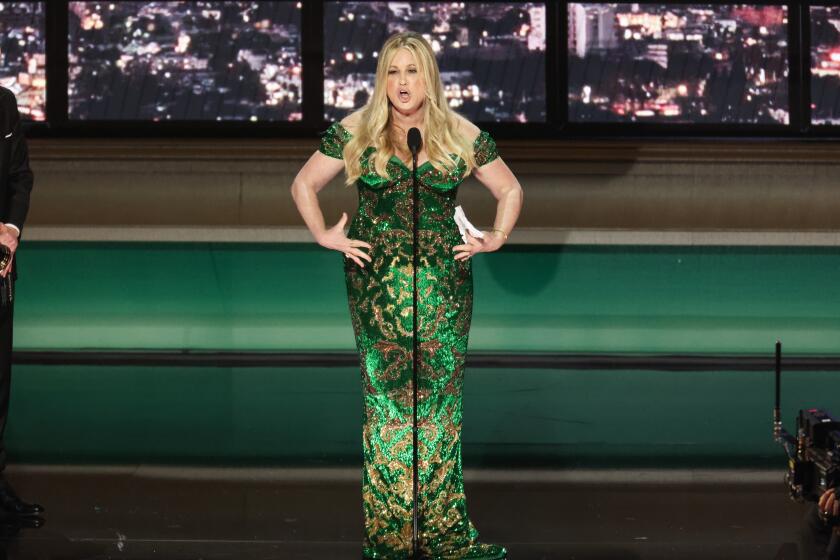How Sheryl Lee Ralph and Dianne Reeves pulled off the Emmys’ ‘best acceptance speech. Ever.’

- Share via
“I am an endangered species / But I sing no victim’s song / I am a woman, I am an artist / And I know where my voice belongs.”
For a fleeting moment at this week’s Emmys , it was story time with Sheryl Lee Ralph. After the visibly shocked performer took the stage Monday night to accept her first-ever Emmy — winning supporting actress in a comedy for her role as veteran kindergarten teacher Barbara Howard in ABC’s “Abbott Elementary” — she took a moment to bask in the ovation and then to gather herself.
And then she sang.
With righteous fervor, Ralph belted out those poignant lyrics from jazz vocalist Dianne Reeves’ 1994 song “Endangered Species.”
It was a moment that brought attendees to their feet and stirred the attention of viewers. A moment that would have surely made church-loving Barbara Howard shout, “Sweet Baby Jesus and the grown one too!” All attention was on Ralph and her voice.
“To anyone who has ever, ever had a dream and thought your dream wasn’t, wouldn’t, couldn’t come true, I am here to tell you that this is what believing looks like, this is what striving looks like,” she said. “And don’t you ever, ever give up on you.”
About 1,000 miles from the glitz and glamour of the ceremony unfolding at L.A.’s Microsoft Theater, Reeves was at a grocery store in Denver when a friend called to relay the news, which was initially met with confusion.
“I was like, ‘No, I’m not at the Emmys, I’m in Denver; I’m at home,’” Reeves recalls. “She said, ‘No, “Endangered Species.”’ I rushed home. It had already happened, so I said, ‘Let me go to Twitter.’ I typed my name in and bam, bam, bam — it was just there. People were just posting like crazy. And that’s how I saw it. And I just kept looking at it over and over and just cried. What a moment. What an incredible moment.”
People who didn’t already know Reeves and her song discovered its dynamism that night.
So naturally, The Times had to bring Ralph and Reeves together over video conference to discuss the emotional moment, the power of the song’s message and who sent the Emmy winner a floral arrangement that had to be wheeled in by two men.
The ‘Abbott Elementary’ star opens up about her ‘rough’ path as a Black woman in show business — and now, at 65, enjoying the view from the top.
Sheryl, congratulations on your Emmy. What a moment for you, what a moment for us.
Ralph: I am still in shock. Still. There are moments when I absolutely feel like I am on the verge of tears. Hold on, let me pick up my dog, because he’s gonna lose his mind. I have this little rescue dog. And he is just in his feelings sometimes.
He just wants you to hold him like you held that Emmy.
Ralph: And his name is Oscar!
The next award, surely. So it’s been a whirlwind?
Ralph: It’s been an absolute whirlwind. And you know, we had to go right back to work. We spent all day, all week preparing, and it just got crazy. It was so intense for me. I couldn’t even do all of those parties. I could only do the Governors Ball and the Disney party. I had to go home. I was tired, I was spent and it was just a lot. But it was a lot of nothing but good vibes. And I didn’t realize the impact until the workers came out from the back, in the kitchen, when the valet guys came up and they said, “This was para me, it was for me.” And I was like, “OK, this is something different going on here.” It’s just kept up like that. And everybody’s fascinated that I sang, and they’re fascinated by the song.
I want to get into that, but first, I want to start with your history together. Tell me how you first met each other.
Ralph: It has been 33 years. Thirty-three years ago, I called Dianne and I said, “Dianne, I am planning and doing a benefit concert to raise awareness around HIV and AIDS. And I just need you to come and sing a song.” And she came and she sang. And she left it all on the floor. And it’s still one of the most memorable moments I have. She answered my call. And she came.
Reeves: It was a very simple setting, voice and accompaniment, and that was the thing that made it really special — being around all of the other people and sharing and talking. But you, Sheryl, were also building sistership and fellowship and all of that, at that time, just by bringing us all together.
Ralph: There used to be a time when radio stations wouldn’t play two or three female songs back-to-back because there were men in power who felt, “Who wants to hear three women in a row sing?” So we were overcoming some things.
Reeves: Well, your night [at the Emmys] — it just went through the airwaves in a way, Sheryl, that people could feel every moment of your moment. It felt live. It felt like we were there in the room. You watch it on television and the energy was just, it was palpable. It was so beautiful.
- Share via
Sheryl Lee Ralph won an Emmy for her turn on ‘Abbott Elementary’ and nearly brought the house down with her rendition of this Dianne Reeves song.
Sheryl, it was clear that you were shocked by your win. It looked like you were taking in everything as you made your way to the stage, and as you looked out to the audience. How spontaneous was that moment? What ignited that song out of you? Did you have an idea of how you wanted this dream-like moment to play out?
Ralph: I was there that night to be supportive of my cast and others. And I did not believe it was going to be me. I didn’t believe it. Everybody else believed it. And so I was actually in shock. When I heard that “Shhhheryl...” I was like, “Oh, my God, this is happening. I am in the land of dreams come true.” Now, mind you, I have been practicing an acceptance speech since I was 5 years old. And everything I thought I was going to say went completely out of my head. And then I thought, “What did I really want people to know?” I wanted them to know: I’m an endangered species. And my journey has been rough in this industry, but I don’t sing any victim’s song. I’m a woman. I’m a strong woman. I’m a strong woman of color. And I know where my voice belongs. And I’ve been singing this song now, God, Dianne, about 15 years or so.
Reeves: Yes, and I’ve seen you and we’ve talked about it.
Ralph: Because I love what she wrote. There are so many more lyrics to the song that speak to me — the next one, in particular: “I shake my fists, but not my hips.” This moment, for me, was my whole career. People can tell you, “Oh, it should have been this, it should have been that.” No, everything should have been exactly what it was and has been for me, because this victory right here is sweet. And yes, I am an endangered species. I’m an artist, I’m a woman, and against it all, against everything these 40 years, I know where my voice belongs still.
Reeves: Amen.
Ralph: I wrote a one-woman show called “Sometimes I Cry” and it was all about real women’s real stories around AIDS and HIV. And through these monologues, I would sing a song. And I opened every show that I performed with “Endangered Species.” Because something about that song, and when I sing it, people react differently. And with what I had seen in the past, on Monday night, I was like, “Oh, it’s for this stage, it’s for right here. It’s for right now.” And so I just I got there, and I gathered myself and the song was just there and it came out. That song was saying: “Sing me.”
Column: Sheryl Lee Ralph and Jennifer Coolidge helped save the Emmys from boring back-to-normal
At the first full-sized Emmys in three years, a few outstanding moments showed what they’re capable of if we don’t settle for ‘back to normal.’
And it yanked people people out of their seats. Who do you remember seeing from the stage?
Ralph: Lizzo, Jean Smart, Michael Keaton, Hannah Waddingham, my husband. I could hear my kids up in the mezzanine. And as a performer, they always say, “If you get a standing ovation, sit down.” When they announced my name — standing ovation. They sat, I gathered myself, I sang the song — standing ovation. Then I finished speaking and said my thanks — standing ovation. And I was like, “Did I just sing, talk, breathe and I got three standing ovations? Thank you, God. Thank you, Dianne Reeves. Thank you for that song.”
Reeves: True to form to who you are: In the midst of this powerful moment for you, you’re still empowering everybody. You changed my life in that moment. I was like, “She’s getting her blessings and she’s blessing everybody else.” My phone was going off, social media, my sister is coming over like, “Girl, do you know... ?” It was crazy.
What did it mean to you to unknowingly share the stage with her in this way?
Reeves: What it says to me is that we are all here for one another. That was the embodiment of that; that was the embodiment of sisterhood; that was the embodiment of empowering. That’s what I felt more than anything. I was looking at you, Sheryl, and then the words that you said in your speech — keep being a doer, a dreamer, keep doing you, you never know when it’s going to happen, just stay steadfast on a journey. And those words, the whole thing was so powerful.
Tell me about the origin story of “Endangered Species.” It’s a song off your album “Art & Survival.” What was going on in your life to prompt that reflection, those lyrics?
Reeves: I was in a situation with my label where I thought, “This might be the last time I’ll ever be able to record something.” It was just really turbulent. I was really trying to not just find myself, but ground myself. And so I talked to my friend Eddie, and I said, “Look, we’re gonna do this record. And I’m going to tell my entire truth. And I’m not going to fade out the songs, I’m going to let it be what it is like when we do it live and I’m not going to edit myself.”
There’s the lyric “I know where my voice belongs.” Tell me what that means to you and how has that evolved through the years. How has it gotten easier or harder to live by that ethos?
Ralph: For me, it’s gotten easier. As an artist, I’ve always been faced with somebody saying, “Don’t rock the boat, just be an artist, just be pretty, just do this, just do that. Nobody wants to hear that. Nobody wants to know about that.” And the thing that I embrace is, if it’s important for me, I’m going to speak about it, I’m going to speak on it, it is part of my truth, my reality.
Reeves: I agree with you 100%. It was at that moment that I knew I had an instrument, which was the sound that you hear, but I also had a voice. And if that instrument wasn’t working, I would always have my voice. And I always felt like I belonged. I always felt like I had something to say. And I knew that I wanted to share that I had a purpose. It’s kind of like those songs I would hear my grandmother, my mother hum, that kept them moving forward.
Ralph: Sometimes there are songs that just connect with you. And this song, from the very first time I heard it, connected with me. The song was me. The song said the things that I wanted to say. And there have been many times where people have said when I speak, “Why do you have to sing? Just speak.” And then I realized something: Anybody that’s ever said that to me, guess what they can’t do? They can’t sing.
Reeves: This song was written by me and a very dear friend of mine, Jeanne Pisano, who’s an incredible writer, and she just wanted me to make sure to tell you, Sheryl, that she’s always admired your talent and watched you out there and wanted me to make sure to thank you for her. You know, the song has always been out there. It shows up in things like “So You Think You Can Dance” or somebody’s skate program. It came out in ’94, and in ’95, Hillary Clinton had a big women’s conference in China and this song opened that conference. And so it’s just always been out there. It’s had a life, but always under the surface. And you have brought this song to the light.
I want to spend some time to talk about the way you both take the stage and what you feel when you’re on it. Because Sheryl, there was something about the way you commanded that stage that was so different from most everybody else that night. Like it felt like a sacred place in that moment, because you were moved by what it all meant, like you knew the mountain you had climbed to get there.
Ralph: I’ve been at this for most of my life, since I was 19 years old. People have said some things to me in this industry that when I repeat them, sometimes people are like, “Nobody could have said that to you.” And I’m like, “Oh, yeah, and I’m making it nice for them.” And I was just going to put it out there: I’m standing right here. I have come up the rough side of the mountain, but I’m standing here right now, with this trophy in my hand, and I don’t look like my journey.
Reeves: I moved to Los Angeles when I was 19 years old to find my dreams. And like Sheryl said, some of the things that people could say to you, where it was all about destroying your heart, and you have to pick yourself up so many times. You start to understand how to navigate this journey, how to understand how to move through it, you start to know how to bring the people that love and support you in close to help you. Oh, we could sit all night, all year, telling stories about how we got through a thing. But the thing is, you got through and it made you stronger, it made you wiser.
Ralph: When I took to the stage, I don’t remember walking. I don’t remember it. I can’t feel my legs going up the steps. I can’t feel it. But when I got center stage, I knew I was home. Because for me, as an artist, center stage is home. And coming from the stage, center stage is to be respected. When you get to center stage, all eyes on you, feel that pressure because I’m about ready to give it to you. I always want to say to people: Do not get up onstage if you are not ready to give the stage the respect it deserves. So when I got there — and that’s like one of the biggest nights in Hollywood — I said, “All right, I’ve been preparing for this. I’m ready. Come on. Let’s do it.”
Reeves: With those arms out and everything.
Sheryl, your millennial fan base couldn’t help but point out the sort of glorious irony of you singing onstage like that, commanding the stage like that, after telling Rita [Lauryn Hill] that music doesn’t pay the bills in “Sister Act 2.” How would you like to respond?
Ralph: [laughs] I just love the fact that they are so in tune. There were some millennials who put up a picture of me as Barbara Hanley [in 1977’s “A Piece of the Action”] and compared it to Barbara Howard. And I was like, “Oh, my God, they’re really paying attention.” And that is a gift. A lot of artists do not get that.
What do you think Rita would say about that moment?
Ralph: Rita would say to you, “What my mama didn’t tell you was that she sang backup for my dad. And when it failed for him, she took it to heart. And she failed herself. And she didn’t mean to do it, but she was trying to pass her lack of dream-come-true on to me. And if I didn’t really embrace my mother’s strength, I would not have had the strength to tell her, ‘Mama, I can sing. I can do this. I can do what you were not able to do.’”
Any chance of a special duet release of this song? How do we make this happen?
Reeves: I’d be open. I could see that. But I can also see it with everybody, just because it is for everybody. I want people to be empowered, I want people to win. Because when you win, I win. It was evident that night.
Sheryl and I have talked before about the teacher who left a lasting impact on her — her kindergarten teacher, Miss Spencer. In the spirit of Barbara Howard, Dianne, who was that teacher for you?
Reeves: It’s someone who’s still in my life, my junior high school teacher. I was 12 years old. We were doing a talent show. I was in the chorus. This young woman was singing “In the Spirit of the Dark,” an Aretha Franklin song, and she asked me to help her sing it. And my my vocal teacher heard me sing it and said, “Who was that singing that?” And she said, “That’s Dianne, Miss Williams.” Her name is Betty Williams. And that began it all.
What was it like to go back on set, Sheryl? Was there any celebration?
Ralph: I have to tell you what happened today. I’m shooting my last scene and they say, “You have to wait.” And I’m like, “I’ve been here since 6 o’clock this morning. You hear my voice, you know I’m tired. I need to go.” And I’m trying to make my way out the door and they open up these big double doors and this huge arrangement is wheeled out and they say, “We’ve been asked to deliver this to you, personally.” They had to put it on, like, a wagon train. Two men bring it in. I opened the card, and it says, “Dearest, Sheryl — Thank you for the best acceptance speech. Ever.” Guess where it was from?
Oprah?
Oprah!
We were talking about sisterhood earlier and I want to talk about the tweet from Jackée Harry, the first Black woman to win in the category, congratulating you, the second woman to win — decades later. Have you had a chance to speak with her?
Ralph: I was fascinated that she spoke about the fact that the role she won for [Sandra Clark in the classic ’80s sitcom “227”], the network originally wanted me for it. But she got it. She won the Emmy. Years later, I get “Abbott,” I win the Emmy — just the way things are supposed to be. I literally had a 6 o’clock call time this morning, and I was in every scene today, so I haven’t been able to call or talk to anybody. But I will reach out to her, absolutely. Heck, I might even have to take her out to dinner. What else do I not know about my career?
What are you going to remember about that night?
Reeves: I’m going to remember the light and the grace. And I’ll always remember how it felt, hearing her sing.
Ralph: I will always remember the fact that I came to center stage at one of the most incredible, important moments in my artistic life. And as a full artist, I was armed with a song. And it was the perfect song for the moment, for me, for the show. And I’m so thankful to Dianne for saying to me, years ago, “Girl, go on, sing the song.” I’ll never forget it. Never.
Reeves: Thank you, Sheryl. You are truly a person that walks the walk that you talk; and have always been. And I cannot thank you enough for this incredible blessing.
More to Read
The complete guide to home viewing
Get Screen Gab for everything about the TV shows and streaming movies everyone’s talking about.
You may occasionally receive promotional content from the Los Angeles Times.










